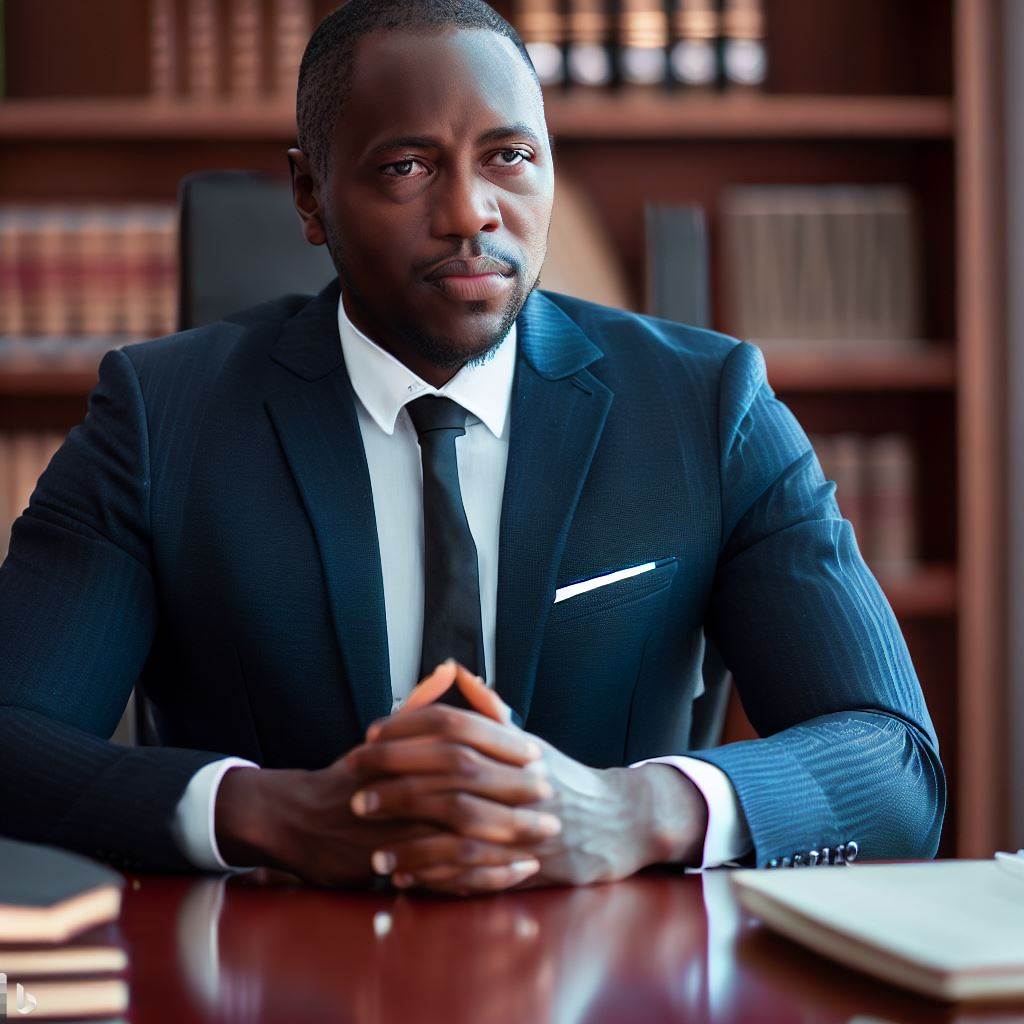Introduction
In Nigeria, where justice is the cornerstone of democracy, lawyers are the sentinels of the law.
Background information about Nigeria’s judicial system
Nigeria boasts a complex judicial structure, comprising federal and state courts, navigating diverse customary and statutory laws.
Importance of lawyers in any legal system
Lawyers are pivotal in upholding the rule of law, ensuring fair trials, and safeguarding citizens’ rights.
The role and significance of lawyers in Nigeria’s judicial system
In Nigeria, lawyers serve as advocates, legal advisors, and catalysts for legal reforms.
Thesis statement
This blog post will explore the important role lawyers play in Nigeria’s judicial system and discuss their impact on justice and society.
In Nigeria’s evolving legal landscape, lawyers are indispensable, fostering equitable access to justice and reinforcing the rule of law.
Read: Legal Challenges and Opportunities in Nigeria’s Entertainment Industry
Overview of Nigeria’s Judicial System
A. Explanation of the branches of the Nigerian legal system
The Nigerian legal system consists of three branches: common law, customary law, and Islamic law.
The common law, inherited from the British colonial era, applies to all Nigerians.
Customary law, on the other hand, reflects the traditional practices of various ethnic and cultural groups in Nigeria.
Islamic law, also known as Sharia law, is applicable to Muslims and is primarily observed in the northern states.
Each branch coexists due to Nigeria’s diverse population and allows for legal pluralism.
B. Role and structure of the judiciary in Nigeria
The judiciary in Nigeria plays a critical role in upholding the rule of law and ensuring justice.
It acts as a separate and independent branch of government, responsible for interpreting and applying the law.
The judiciary acts as a check on the executive and legislative branches, preventing abuses of power.
It safeguards individual rights and holds the government accountable for its actions.
The structure of the judiciary in Nigeria follows a hierarchical system.
At the top is the Supreme Court, which is the final court of appeal in the country.
Below the Supreme Court are the Court of Appeal and the High Court of each state.
Magistrates’ and customary courts handle less complex matters at the local level.
C. Introduction to the hierarchy of courts in Nigeria
The Nigerian judicial system follows a pyramid-like structure consisting of federal and state courts.
At the federal level, the Supreme Court serves as the apex court, with the final say on legal disputes.
Below the Supreme Court, the Court of Appeal sits as the intermediate appellate court.
Further down the hierarchy are various High Courts, which have jurisdiction over civil and criminal matters.
At the state level, there are State High Courts, High Court of the Federal Capital Territory, and Customary Courts.
Magistrate and Customary Courts handle matters involving traditional and customary laws.
The hierarchy ensures efficient and unambiguous resolution of legal disputes.
D. Challenges and importance of a fair and independent judicial system
A fair and independent judicial system is crucial for upholding justice and promoting the rule of law.
Challenges in Nigeria’s judicial system include corruption, political interference, and court delays.
These issues undermine public confidence and hinder the effective functioning of the legal system.
Maintaining a fair and independent judiciary ensures equal access to justice for all citizens.
It promotes social stability, attracts foreign investment, and protects human rights.
An impartial judiciary safeguards against the abuse of power by the executive and legislative branches.
It enforces constitutional rights, resolves disputes, and helps maintain a just society.
Investments in the judiciary, such as training, infrastructure, and technological advancements, are essential.
A properly functioning judicial system is the cornerstone of a democratic society and paves the way for progress.
Basically, Nigeria’s judicial system encompasses common law, customary law, and Islamic law.
The judiciary plays a vital role in upholding the rule of law, ensuring justice, and preventing abuse of power.
The hierarchical structure of courts guarantees access to justice, with the Supreme Court as the apex.
However, challenges such as corruption and political interference must be addressed to maintain a fair and independent judiciary.
By doing so, Nigeria can strengthen its legal system, protect human rights, and foster social and economic development.
Read: Nigerian Attorneys and Social Justice: A Critical View

The Role of Lawyers in the Nigerian Judicial System
Advocacy in court proceedings
- Legal representation by lawyers in Nigeria’s courts involves representing clients in litigation.
- Lawyers have the duty to present arguments, examine witnesses, and cross-examine opponents.
- Effective representation by lawyers is essential in ensuring justice and protecting individuals’ rights.
Legal advice and consultations
- Lawyers play a crucial role in providing legal guidance and advice to clients.
- They help individuals understand their legal rights and responsibilities.
- Legal consultations with lawyers are important in preventing conflicts and potential legal issues.
Drafting and reviewing legal documents
- Lawyers are involved in drafting legal documents, such as contracts, wills, and agreements.
- Attention to detail by lawyers ensures that legal documents are valid and enforceable.
- Lawyers review legal documents to protect their clients’ interests.
Alternative dispute resolution
- Alternative dispute resolution methods like mediation and arbitration are introduced.
- Lawyers act as mediators or arbitrators to assist parties in resolving disputes outside of court.
- Alternative dispute resolution methods have benefits, and lawyers facilitate negotiations.
In Nigeria’s judicial system, lawyers play a vital role that extends far beyond their presence in courtrooms.
Their role encompasses various areas of legal practice, ensuring the functioning and effectiveness of the system as a whole.
A. Advocacy in court proceedings
One fundamental aspect of a lawyer’s role is advocacy in court proceedings.
When clients face legal battles, lawyers represent them in litigation.
Legal representation involves presenting arguments, examining witnesses, and cross-examining opponents.
It is through this process that lawyers strive to secure justice and protect the rights of their clients.
B. Legal advice and consultations
Legal advice and consultations are also significant aspects of a lawyer’s role.
Lawyers provide essential guidance and advice to clients, helping them understand their legal rights and responsibilities.
By offering clarity on complex legal matters, lawyers empower individuals to make informed decisions.
Legal consultations serve as preventive measures, minimizing conflicts and potential legal issues before they escalate.
C. Drafting and reviewing legal documents
Drafting and reviewing legal documents is another crucial function of lawyers.
They are skilled in the art of crafting legally sound documents, such as contracts, wills, and agreements. Lawyers’ attention to detail ensures that these documents are valid, enforceable, and protect their clients’ interests.
Through careful review, lawyers mitigate the risks associated with legal documents, safeguarding their clients from potential disputes or liabilities.
D. Alternative dispute resolution
Lawyers also have a role to play in alternative dispute resolution.
Methods like mediation and arbitration offer alternatives to traditional court proceedings.
Lawyers can act as mediators or arbitrators, assisting parties in resolving conflicts outside of the courtroom.
These alternative methods provide numerous benefits, including cost-effectiveness, privacy, and faster resolution of disputes.
Lawyers, with their expertise, facilitate negotiations and help parties find amicable solutions.
Overall, lawyers are indispensable to Nigeria’s judicial system.
Their commitment to advocacy, provision of legal advice, drafting and reviewing legal documents, and involvement in alternative dispute resolution collectively contribute to the functioning of an efficient and just legal system.
Lawyers’ active involvement ensures proper representation, protects individuals’ rights, and upholds the rule of law.
Thus, their significance cannot be overstated in Nigeria’s judiciary.
Read: Understanding Litigation in Nigeria: A Guide for Attorney
The Impact of Lawyers on Nigeria’s Judicial System
Advancing justice and the rule of law
- Lawyers play a crucial role in upholding justice and the rule of law in Nigeria.
- They ensure fair trials, protect constitutional rights, and promote access to justice.
- Lawyers are instrumental in bringing about positive legal changes and societal advancements.
Protecting the rights and interests of individuals
- Lawyers act as defenders of human rights and the interests of their clients.
- They fight against injustice, discrimination, and inequality.
- Lawyers safeguard the rights of vulnerable individuals and marginalized groups.
Contributing to legal education and reform
- Lawyers have a significant role in legal education and training in Nigeria.
- They contribute to shaping legal reforms and policies.
- Continuous legal education and professional development are important for lawyers.
Lawyers in Nigeria have a substantial impact on the country’s judicial system.
They play a crucial role in advancing justice, upholding the rule of law, and protecting the rights and interests of individuals.
Read: The Evolution and History of Legal Professions in Nigeria
A. Advancing justice and the rule of law
One of the primary contributions of lawyers is their commitment to ensuring fair trials, protecting constitutional rights, and promoting access to justice.
They act as advocates for their clients, ensuring that their rights are respected and that they receive a fair and just trial.
By upholding justice and the rule of law, lawyers help maintain a thriving judicial system that is essential for a functioning democracy.
B. Protecting the rights and interests of individuals
In addition to their role in the courtroom, lawyers also have a significant impact outside of it.
They fight against injustice, discrimination, and inequality, defending the rights of their clients and advocating for change.
Many lawyers in Nigeria have taken on cases that have led to positive legal changes and advancements in society.
Their efforts have influenced policy decisions and helped bring justice to marginalized communities.
Lawyers act as defenders of human rights and the interests of their clients.
They stand up against powerful entities and individuals to ensure that justice is served.
By taking on cases involving vulnerable individuals and marginalized groups, lawyers protect their rights and create a more inclusive and equitable society.
C. Contributing to legal education and reform
Moreover, lawyers contribute to legal education and reform in Nigeria.
They are actively involved in legal education and training, imparting their knowledge and experience to the next generation of legal professionals.
By sharing their expertise, lawyers help develop competent and ethical lawyers who can uphold the principles of justice and the rule of law.
Furthermore, lawyers play a crucial role in shaping legal reforms and policies.
Through their engagement in legal advocacy and lobbying, they provide valuable insights and recommendations to government bodies responsible for developing and amending laws.
Their expertise and understanding of legal issues make them instrumental in drafting legislation that aligns with the principles of justice and promotes a fair and equitable legal system.
Continuous legal education and professional development are essential for lawyers to stay updated with the evolving legal landscape.
They must remain up-to-date with current legal developments, precedents, and best practices.
By investing in their professional growth, lawyers ensure that they are equipped with the necessary skills and knowledge to effectively represent their clients and uphold the principles of justice.
Publish Your Professional Profile, Business or Brand
Showcase your expertise, gain trust, and boost visibility instantly on Professions.ng.
Publish NowGenerally, lawyers play a vital role in Nigeria’s judicial system.
They advance justice, uphold the rule of law, protect individual rights, and contribute to legal education and reform.
Their contributions are crucial for maintaining a fair and just society that upholds the principles of justice and equality.
Read: Litigation and Dispute Resolution in Nigeria’s Entertainment Sector
Learn More: Nigeria’s Fight Against Corruption: Law’s Critical Role
Conclusion
Recapping the key points discussed about the role of lawyers in Nigeria’s judicial system, it is evident that they play a crucial role in promoting justice, protecting rights, and contributing to societal development.
Emphasizing their significance is vital as they serve as advocates for the rule of law, ensuring fair proceedings and equal access to justice for all.
In a nutshell, it is imperative to recognize and support the invaluable role of lawyers in Nigeria’s judicial system.
Their dedication and expertise are essential in upholding the principles of justice and advancing the overall development of the country.
Let us reflect on the thought that without lawyers, the judicial system would lack the necessary guidance and protection for individual rights.
It is our responsibility to acknowledge and support the work of lawyers in shaping a just society.




